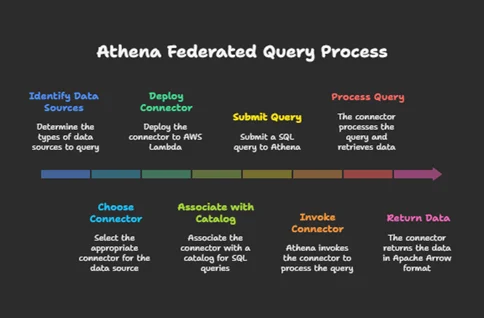|
Voiced by Amazon Polly |
Overview
Modern organizations generate and store data across diverse systems, transactional databases, NoSQL stores, logs, cloud storage, and even on-premises servers. While each system is optimized for its specific use case, this distribution of data often creates silos that make unified analysis difficult. Traditionally, businesses rely on ETL (Extract, Transform, Load) pipelines to centralize this data in a warehouse or data lake before running analytics. However, ETL processes introduce latency, increase costs, and require heavy maintenance.
Amazon Athena Federated Queries solves this problem by allowing you to query data across multiple sources in real-time, without moving it. Using simple SQL, you can join data from Amazon S3, Amazon DynamoDB, Amazon RDS, Amazon CloudWatch Logs, or even custom data stores through connectors. This serverless approach streamlines analytics, reduces operational overhead, and accelerates decision-making.
Pioneers in Cloud Consulting & Migration Services
- Reduced infrastructural costs
- Accelerated application deployment
Introduction
As businesses embrace digital transformation, the variety, velocity, and volume of data continue to grow. A retail company may track Amazon RDS sales, Amazon DynamoDB product inventory, customer engagement in Amazon S3, and system logs in Amazon CloudWatch. Finance teams may use Amazon Redshift for reporting, while engineers rely on Redis for caching. Each tool is valuable on its own, but the real insights emerge when these datasets are analysed together.
Traditionally, data engineers build pipelines that move or replicate this data into a single system, often an enterprise data warehouse or a data lake. While effective, this approach has several drawbacks:
- High costs due to data duplication and storage.
- Time-consuming ETL jobs that delay analysis.
- Complex operations to maintain pipelines as schemas and requirements evolve.
- Security risks from unnecessary data movement.
Amazon Athena Federated Queries provide a better way. Instead of centralizing data, Athena brings the query to where the data lives. By leveraging AWS Lambda–based Data Source Connectors, Amazon Athena extends its SQL capabilities to external systems, making analytics simpler, faster, and more cost-effective.
Federated Queries
Amazon Athena is a serverless, pay-per-query analytics service that traditionally works with data stored in Amazon S3. Amazon Athena can query data in other AWS services and external databases with federated queries without ETL.
Connectors deployed as AWS Lambda functions translate queries into the source system’s language, retrieve results in Apache Arrow format, and return them to Amazon Athena for processing.
How Does Amazon Athena Federated Query Work?

Here’s how the workflow looks:
- Submit SQL Query in Amazon Athena:
Users write SQL queries referencing multiple catalogs (each catalog = one connector).
- Amazon Athena Query Engine Parses Query:
Amazon Athena decides which parts of the query belong to which data source.
- AWS Lambda Connectors Invoked:
The relevant connectors run as AWS Lambda functions to fetch data.
- Predicate Pushdown:
Filters (WHERE clauses) are executed at the source to reduce scanned data.
- Data Returned in Arrow Format
Data is streamed back efficiently.
- Final Aggregation in Amazon Athena
Amazon Athena combines results, applies joins, and delivers the final dataset.
Benefits of Amazon Athena Federated Queries
- Query in place – No need to duplicate or move data.
- Cost savings – Pay only for queries and scanned data.
- Serverless scaling – AWS Lambda and Amazon Athena scale automatically.
- Cross-source joins – Combine structured and unstructured data seamlessly.
- Customizable – Build connectors for proprietary or niche systems.
- Secure – Integrates with AWS Lake Formation for access control.
Use Cases
- Customer 360 View: Join sales (Amazon RDS), web logs (Amazon CloudWatch), and user profiles (DynamoDB).
- Operational Monitoring: Combine Redis cache metrics, Amazon RDS transactions, and system logs.
- Data Mesh: Empower domain teams while enabling centralized analytics.
- Fraud Detection: Correlate transaction data with suspicious logins in real-time.
Conclusion
Amazon Athena Federated Queries enable organizations to break data silos and analyze information across multiple systems without moving data. Businesses can perform unified, serverless, cost-effective analytics by combining Amazon Athena’s SQL capabilities with Lambda connectors. Whether for customer insights, operational monitoring, or modern data mesh architectures, Amazon Athena federated queries provide a flexible foundation for next-generation data strategies.
Drop a query if you have any questions regarding Amazon Athena and we will get back to you quickly.
Empowering organizations to become ‘data driven’ enterprises with our Cloud experts.
- Reduced infrastructure costs
- Timely data-driven decisions
About CloudThat
CloudThat is an award-winning company and the first in India to offer cloud training and consulting services worldwide. As a Microsoft Solutions Partner, AWS Advanced Tier Training Partner, and Google Cloud Platform Partner, CloudThat has empowered over 850,000 professionals through 600+ cloud certifications winning global recognition for its training excellence including 20 MCT Trainers in Microsoft’s Global Top 100 and an impressive 12 awards in the last 8 years. CloudThat specializes in Cloud Migration, Data Platforms, DevOps, IoT, and cutting-edge technologies like Gen AI & AI/ML. It has delivered over 500 consulting projects for 250+ organizations in 30+ countries as it continues to empower professionals and enterprises to thrive in the digital-first world.
FAQs
1. Can Amazon Athena federated queries update or insert data into external sources?
ANS: – No. Federated queries are read-only. They cannot perform write operations.
2. What happens if my AWS Lambda connector times out?
ANS: – The query fails. You can optimize queries with filters or increase AWS Lambda’s timeout.
3. Can I join data from Amazon S3 with Amazon DynamoDB or Amazon RDS?
ANS: – Yes. Amazon Athena supports cross-source joins, allowing you to combine Amazon S3 data with external sources in one SQL query.

WRITTEN BY Anusha
Anusha works as a Subject Matter Expert at CloudThat. She handles AWS-based data engineering tasks such as building data pipelines, automating workflows, and creating dashboards. She focuses on developing efficient and reliable cloud solutions.


 Login
Login


 September 3, 2025
September 3, 2025 PREV
PREV











Comments